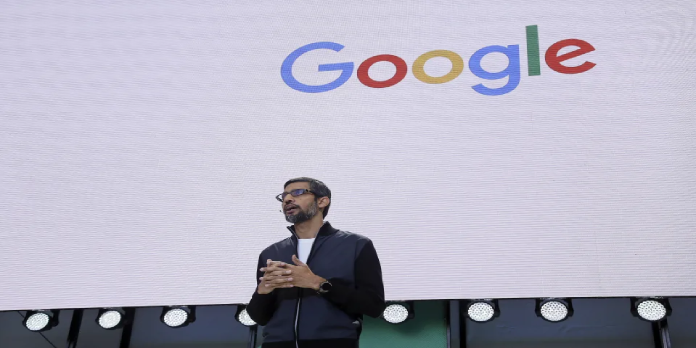In a federal lawsuit brought by a group of attorneys general, Google’s app store, Google Play (GOOG, Google GOOGL), became the latest target for Big Tech antitrust regulators Wednesday.
This case was brought before the U.S. District Court in the Northern District of California. It is one of many lawsuits Google’s parent company Alphabet faces in a series of global actions challenging the tiers of its dominant markets. The docket entry for this lawsuit did not immediately make the complaint available.
A Google spokesperson stated that the company’s policies regarding app stores were protected and distinguished it from Apple and the App Store in a statement before the suit was filed.
According to the spokesperson, Android is the only central operating platform that allows users to download multiple stores. “Many Android devices come preinstalled with at least two or three app stores. Then, if they wish, they can install additional apps or stores directly from their browser.
The antitrust lawsuit filed by Epic Games, a developer of “Fortnite,” against Google’s Play Store is part of the legal action brought by the attorney’s general. The video game developer claims that Google uses its monopoly power to force developers to use its payment system. This is a 30% commission.
Epic’s fight with Google has been put on hold while it fights with Apple over its App Store policies, which require developers to pay fees for purchases made by consumers. U.S. District Judge Yvonne Gonzalez Rogers is expected to rule this summer. The case against Epic could be brought to trial soon after.
Google’s antitrust problems with the Play Store don’t just concern Epic or the state attorneys general. A class-action lawsuit is pending against the company in Northern California for its app store fees.
It’s not only Google’s Play Store under intense antitrust scrutiny. Antitrust regulators from different agencies are looking at various aspects of Google’s vast-ranging businesses.
In October, the Justice Department and attorneys general sued Google, alleging that the tech giant used anticompetitive tactics to extend and maintain its monopolies in search advertising, general search services, and general text advertising markets. These were the foundations of its empire.
A bipartisan group made up of attorneys general from both the Democratic and Republican parties filed a complaint against Google in December alleging that it illegally used exclusionary agreements with Apple (AAPL) and other mobile device provider providers to make Google the default search engine for devices and services, including the iPhone.
Google was also accused of using its market power in search to prevent specialized search sites such as Expedia (EXPE), Angie’s List, and Yelp(YELP) access to “prime reality” on its search results pages. It also used its search-engine marketing tool to deprive rivals like Microsoft’s (MSFT), Bing, of ad dollars.
A separate group of attorneys general alleged that Google’s adtech business violates antitrust laws. They claim it tried to crush competition using exclusionary tactics. This included a deal with Facebook (FB), its largest competitor, to manipulate advertising auctions.
Google is also under legal scrutiny overseas. The European Commission, the European Union’s antitrust watchdog, announced on June 22 that it would conduct a formal investigation into Google’s ad tech dominance.
The commission will investigate whether Google engages in illegal “self-preferencing” by favoring its products and services through online ads are brokered, and user data is shared with advertisers.
Although the investigation is still in its infancy, it will take at least a year for the commission to decide if there is enough evidence to warrant a penalty or reduction. The agency has already targeted Google before. The commission has ruled against Google in three antitrust investigations that totaled $9 billion.
After the May trial, the outcome of the ongoing dispute between Epic Games (Apple) is likely to impact antitrust actions against Google Play. The distinction between Google’s platform allows third-party apps to be downloaded on its mobile devices and the Apple platform that couldn’t impact the final decisions.
The United Kingdom authorities are also investigating app store rules. Australian authorities gave Apple and Google one-year notices to allow competition in their app stores or take other measures to mitigate the effects, including legislation.
Google suits are just one part of a more significant reckoning for the tech industry. For example, the Federal Trade Commission (FTC) and a coalition of state attorneys general filed two separate antitrust lawsuits against Facebook. The FTC sought to disintegrate the social media giant. However, a federal judge ruled that both cases were dismissed on their grounds. FTC’s case was thrown out without prejudice because it was not “legally feasible.” However, the commission has the option to amend its filing so that it can be reassessed.
Amazon is currently under investigation by both the Attorney General of New York and California and FTC. Apple is also under investigation by the DOJ for its App Store policies.
The House Judiciary Committee presented six bipartisan antitrust bills last month that could have some companies forced to separate parts of their businesses.
As they are written, the bills would prevent companies from favoring their services and prohibit them from requiring their clients to use their secondary platforms to access their services. For example, Amazon forcing third-party sellers into its logistics platform.



